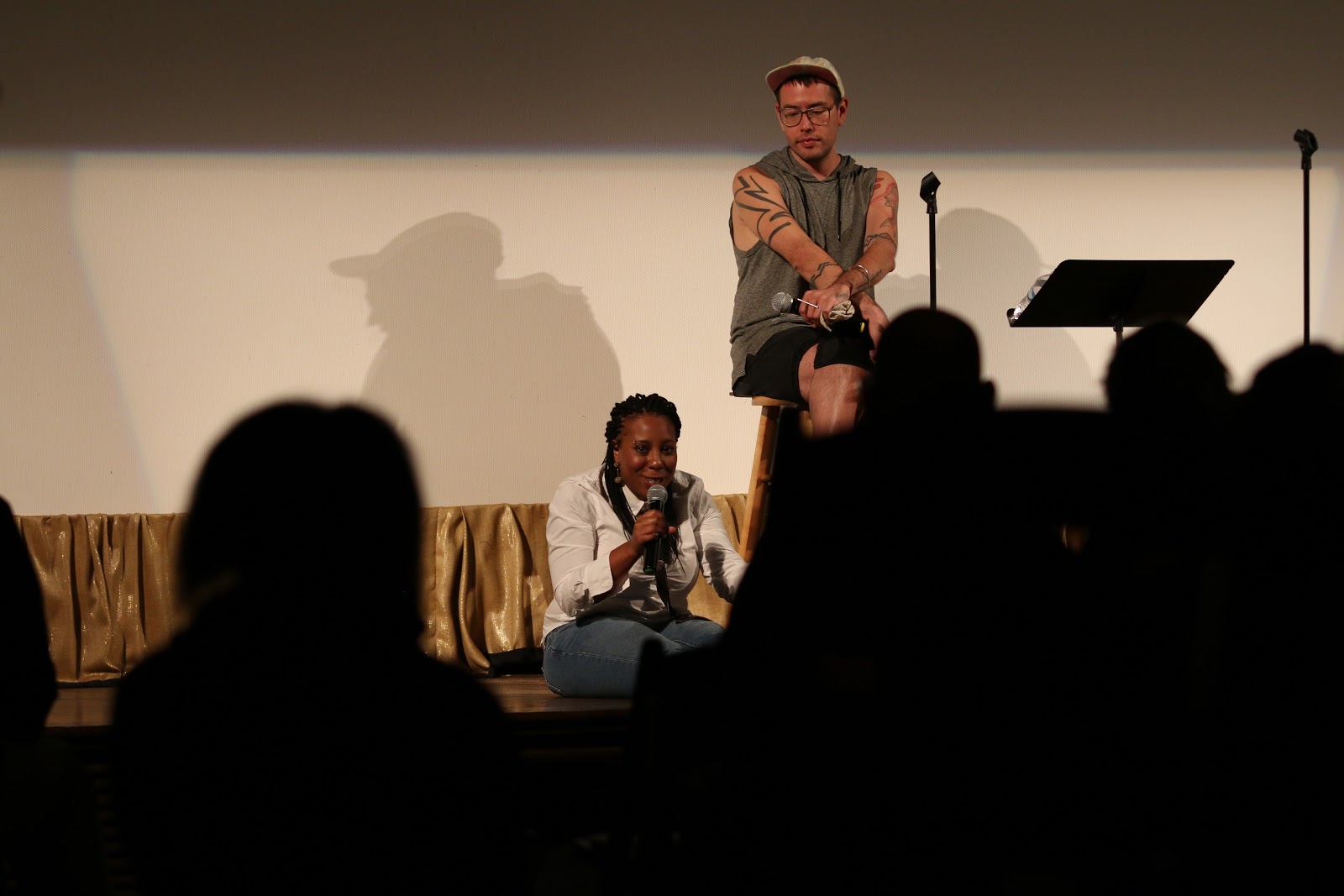This content is being reviewed in light of recent changes to federal guidance.
“You Need to Live More”: the Power of Performance in Morgan Parker’s and Tommy Pico’s Poetry
[By: Morgan McComb]

Black Poetry Day is held every year on October 17th, the birthday of Jupiter Hammon, the first published Black poet. Hammon, who was first published when he was 49, is considered the beginning of an incomparable legacy of Black poets including Phyllis Wheatley, Paul Laurence Dunbar, Langston Hughes, Claude McKay, Gwendolyn Brooks, Sterling A. Brown, Lucille Clifton, Maya Angelou, Amiri Baraka, Rita Dove, Audre Lorde, Harryette Mullen, Evie Shockley . . . and the list goes on.
The fact that it is impossible to list all of the world’s incredible Black poets is a testament to how impactful their writing was, is, and will continue to be. The sheer quantity of writing by Black poets also demonstrates how imperative it is to recognize their work in the face of the global rise of xenophobia, fascism, and tribalism, movements that all aim to silence not only Black voices but the voices of people of color across the world and reify a white patriarchal power that denies the humanity of each one of the poets I have named and more.
But as Maya Angelou famously wrote, “Still I Rise,” and this rising was undeniably present at Liberty Hall Theatre in Lawrence, Kansas, on October 10th, 2018, when poets Morgan Parker and Tommy Pico entered the room and made it move. Both poets began by reading each other’s poems, a demonstration of connectedness and community that set the tone and helped the audience realize that when they say poetry is about humanity and connection, they practice what they preach.
Tommy Pico, an indigenous poet originally from the Viejas Indian reservation of the Kumeyaay nation, is more than a poet: while currently working as a screenwriter, they also co-curate the reading series Poets with Attitude, co-host the podcast Food 4 Thot, and have a Twitter presence that, in my opinion, rivals the greatest tweeters of our time (as evidenced in a recent tweet, a pun on Carson McCullers’s famous novel: “the heart is a lonely hunty”). As Pico took the mic, they said it made them feel “like a comedian,” and the subject of humor and its uses in a political atmosphere that often has us reaching for books to forget the atrocities of the world rather than confront them was a recurring theme. Pico opened with Parker’s titular poem from her 2017 collection There Are More Beautiful Things than Beyoncé, and one of those things, according to Parker, includes “self-awareness,” a trait that Pico has in spades in their assertion at the top of the hour that they have “the inability to be anything other than myself.” They read a passage from their 2018 book Junk—a series of four book-length poems that also includes IRL (2016), Nature Poem (2017), and the forthcoming Feed (2019)—a book that grew out of Pico’s love of the poetic rhetoric of Tumblr and in defense of junk “getting a bad rap because of capitalism.” The room shifted with each undulation of Pico’s voice, a voice and performance distinctive in their vulnerability and theatricality.
Pico’s power as a poet lies in their juxtaposition not just of words but feelings, thoughts, and emotions—when they finished their reading, I felt both energized and breathless, buzzing from head to toe mentally and physically. “Junk,” a derogatory word, is used and lauded by Pico in myriad ways, but what Junk continually returns to are the things we love that people tell us not to—the things we love but cannot because of outside expectations or the need to “perform ourselves.” That self-consciousness is entirely abandoned in Pico’s poetry, poetry that demands you not only listen but examine the things in your life that you have designated useless or of little value—like maybe even your own voice.
As Morgan Parker took the stage, her first words reify Pico’s demand that we examine ourselves and our emotions: in reference to her introduction by community writer and poet Rachel Atapka, Morgan said that “this is the first time I’ve ever been called cool,” and that her poetry, which she self-describes as “sad,” is good because “being sad is cool.” She says it with her tongue firmly planted in her cheek, but in this allusion to her own mental health issues she exposes the need for self-discovery through writing. Parker noted that the day of her and Pico’s reading was World Mental Health Day, and the struggle for understanding her own mental health is powerfully explored in all of her books including the poem “99 Problems” in which the fifty-first problem is “I can’t feel anything.”
The poems Parker chose to read focused not only on mental health but also on her own identity as a black woman, an identity that is more often than not bifurcated and essentialized. Parker’s poems defy form and structure, a poetic method reflected in the wide-reaching topical foci of her own work. The second poem Parker read from There Are More Beautiful Things Than Beyoncé was “Heaven Be a Xanax,” a poem that starts with her “[c]rying in the Gap by my therapist’s office” and ends with her praying, “address[ing] the prayer to myself/And I will be allowed.” “Heaven Be a Xanax,” like much of Parker’s work, starts somewhere and ends up somewhere else, but it is ultimately about understanding and loving your own contradictions, recognizing your weaknesses while celebrating your resiliency. Parker’s closing poem “Now More Than Ever,” to be published in her forthcoming book Magical Negro (2019), tackles the issue of white guilt through a critique of the white refrain “now more than ever,” demonstrating how even words meant to note a political awareness represent a form of privilege that is undeniably harmful to true racial progress. The finale of her poem brings to a head her message through the repetition of “and ever and ever and ever and ever and ever,” representing the seemingly endless struggle for racial equality. As she read the final lines, Parker made her way across the stage, to the edge of the stage, to the floor of the stage, and finally offstage, still reciting, making the connection between poetic message and physical performance.
As the event opened for audience questions, one theme rang true: the power of performance, a power that both of these poets undeniably have. When asked about how they think of performance, Parker said that “it’s pointless if I show up and you don’t understand me” and that “especially with trauma and with racism,” poetic performances “have to have humor, they have to entertain, they have to be alive—it’s me saying ‘Here’s what’s up.’” Pico echoed Parker in response to the same question: “If I’m not feeling something, I don’t expect you to feel something.” And everyone in that room felt something.
Black Poetry Day is about recognizing not only struggle but triumph, both of which characterize not only Parker and Pico’s work but also the writings of Black poets and other poets of color. In the final question from the audience, Parker and Pico were asked how they deal with writer’s block. Parker answered: “You have to go outside—you need to live more.” In a time where many people are afraid of doing just that because of their race, sexual orientation, nationality, gender—the list goes on—Parker and Pico’s unabashed and unapologetic declarations of self-love through their writing are revolutionary acts in and of themselves.
 Morgan McComb is a graduate student and instructor at the University of Kansas. Her research focuses on Black poetry since the Black Arts Movement. She works at the Project on the History of Black Writing and at the Raven Book Store in Downtown Lawrence, Kansas. She is originally from Clinton, Mississippi.
Morgan McComb is a graduate student and instructor at the University of Kansas. Her research focuses on Black poetry since the Black Arts Movement. She works at the Project on the History of Black Writing and at the Raven Book Store in Downtown Lawrence, Kansas. She is originally from Clinton, Mississippi.